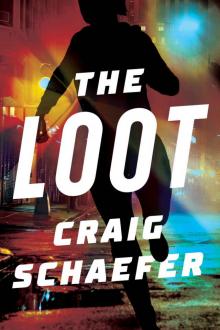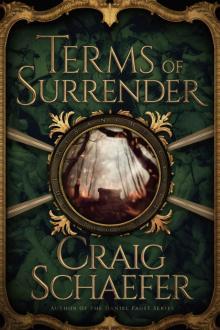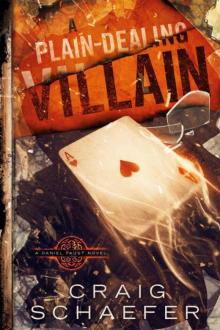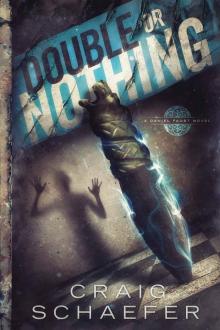- Home
- Craig Schaefer
The Instruments of Control (The Revanche Cycle Book 2)
The Instruments of Control (The Revanche Cycle Book 2) Read online
The Instruments of Control
The Revanche Cycle, Book Two
by Craig Schaefer
Copyright © 2015 by Craig Schaefer.
All rights reserved. No part of this publication may be reproduced, distributed or transmitted in any form or by any means, including photocopying, recording, or other electronic or mechanical methods, without the prior written permission of the publisher, except in the case of brief quotations embodied in critical reviews and certain other noncommercial uses permitted by copyright law.
Publisher’s Note: This is a work of fiction. Names, characters, places, and incidents are a product of the author’s imagination. Locales and public names are sometimes used for atmospheric purposes. Any resemblance to actual people, living or dead, or to businesses, companies, events, institutions, or locales is completely coincidental.
Cover Design by James T. Egan of Bookfly Design LLC.
Author Photo ©2014 by Karen Forsythe Photography
Craig Schaefer / The Instruments of Control — 1st ed.
ISBN 978-0-9961927-0-5
CONTENTS
Chapter One
Chapter Two
Chapter Three
Chapter Four
Chapter Five
Chapter Six
Chapter Seven
Chapter Eight
Chapter Nine
Chapter Ten
Chapter Eleven
Chapter Twelve
Chapter Thirteen
Chapter Fourteen
Chapter Fifteen
Chapter Sixteen
Chapter Seventeen
Chapter Eighteen
Chapter Nineteen
Chapter Twenty
Chapter Twenty-One
Chapter Twenty-Two
Chapter Twenty-Three
Chapter Twenty-Four
Chapter Twenty-Five
Chapter Twenty-Six
Chapter Twenty-Seven
Chapter Twenty-Eight
Chapter Twenty-Nine
Chapter Thirty
Chapter Thirty-One
Chapter Thirty-Two
Chapter Thirty-Three
Chapter Thirty-Four
Chapter Thirty-Five
Chapter Thirty-Six
Chapter Thirty-Seven
Chapter Thirty-Eight
Chapter Thirty-Nine
Chapter Forty
Chapter Forty-One
Chapter Forty-Two
Chapter Forty-Three
Chapter Forty-Four
Chapter Forty-Five
Chapter Forty-Six
Chapter Forty-Seven
Chapter Forty-Eight
Chapter Forty-Nine
Chapter Fifty
Chapter Fifty-One
Afterword
CHAPTER ONE
Otto Blum often claimed he’d lost his taste for prayer. Years on the front lines against the Terrai, endless months of bloodshed and savagery, had turned the words to ashes in his mouth. Peacetime granted him an officer’s commission and a comfortable job behind a desk at Fort Blackwood, but along the way he’d swapped his childhood faith for a lifetime of nightmares.
Nightmares that came true, the moment a coarse burlap hood slipped over his head and rough hands dragged him from his bed in the still hours of the night.
They’d taken off the hood maybe an hour later, so he could see where he was going. It wasn’t a kindness. Now he clutched the bars of a wheeled wicker cage, drawn along the brambly forest trail by a tired nag. Ragged men with pale skin and hard eyes surrounded him.
Suddenly, the prayers of his childhood were all he had left.
“Gardener,” Otto whispered, “I am your son, fruit of your soil. Do not forsake me in my hour of distress—”
“Shut it,” one of the rebels said, slapping the side of the cage with the flat of a crudely hammered sword. “Your god’s forsaken you, fat little dog. You’re on the Lady’s sacred soil, where the wolves come out to play. And the wolves are hungry tonight.”
Otto heard howling up ahead, howling that devolved into braying, raucous laughter. As the cart slowly rounded a bend, a circle of yellow torchlight made Otto’s breath seize in his throat.
A man in the tatters of an Imperial uniform hung impaled on a tall wooden stake. He’d been skinned. They’d draped his skin and clothes back over his body, left to droop and puddle in pockets of decaying flesh. The corpse’s jaw drooped slack, most of the teeth crudely hammered out.
Ragman, Otto thought, his days on the front surging back to him. His sergeant, a man named Werner Holst, had ordered every soldier in his unit to carry a mercy knife—so if they were ever overrun they could slash their own throats rather than fall into the hands of the Terrai.
He wished he had one now.
More torches lit a forest clearing, and a bonfire sent thick plumes of black smoke up to kiss the face of the full moon. Terrai in gray furs danced and sweat and leaped around the flames, passing crusty bottles and spitting mouthfuls of wine into the fire. A musician played his panpipes, filling the air with discordant, jagged notes that echoed Otto’s fluttering heartbeat.
The cart stopped. Two of the rebels unlocked the cage and hauled him out, throwing him to his hands and knees on the wet grass. Otto looked up, slowly, at the man who stood before him.
He was slender, with sparse hair the color of straw and a long, narrow chin. He wore a mantle and cloak of gray wolfskin, the furred shoulders swallowing up his thin, almost emaciated body, and a pewter medallion resembling the face of a full moon.
“Do you know who I am, Imperial?” he asked.
Otto knew. He forced the words out, one by one. “Judicael Leclerc. Knight-commander of the Autumn Lance. Warlord.”
“And do you know where you are?”
“The Floating—” Otto stumbled over the words. “The Floating Court.”
Otto’s men thought it was a myth. The last remnants of Terrai royalty, driven from their ruined palaces, set adrift in their own homeland like nomads. He knew better. His own superiors had confirmed that the Floating Court existed; they just couldn’t find the damn thing. All they knew was that a train of partisan fighters followed it wherever it went—and wherever the Court went, loyal Imperials vanished and died. They died badly.
“Then you know,” Judicael said conversationally, “that things aren’t looking good for you right now.”
“N-no, sir,” he stammered.
Judicael flung out his arms, grinning at the rebels who surrounded them.
“Sir! Sir, he calls me! They’ll invade our homes, smash our shrines, and butcher our children in their cribs, but get one alone and on his knees and suddenly it’s, ‘Yes, sir, no, sir!’ He’ll offer to suck my cock next.”
Otto winced. Cruel laughter echoed around him. He looked to the men’s faces, starving for a crumb of mercy in one rebel’s eyes, the tiniest hint of compassion. He found none.
“You forgot one of my titles,” Judicael said. “Acting regent, ever since King Bonnaire was drawn and quartered for your emperor’s pleasure. But it’s all right. We don’t stand on formality here. Do we, lads?”
More laughter. “N-no, sir!” one piped up, mocking Otto’s stammer.
Judicael leaned closer, looming over him. “What’s your name, dog?”
Otto squared his shoulders and looked him in the eye. He couldn’t keep the fear from his voice, but damned if he’d cower. “Otto. Sergeant Otto Blum, paymaster for Fort Blackwood.”
“You’re a very lucky man, Otto. You sound like a person who knows things, and that’s just what we need right now. Our scouts spotted a larg
e detachment of soldiers leaving Blackwood this afternoon, heading northeast. Why?”
Otto spent a lifetime believing he was a man of honor. Before that moment, though, he’d never been put to the test.
Breathing one word of the news he’d received, the orders he’d been given, would be high treason. He’d be spitting on his command, his honor, and every ideal he’d sworn to uphold as a soldier for the Murgardt Empire.
On the other hand, he was a prisoner of the Terrai. The Wolves in the West. And he knew what they did to their prisoners.
They’ll make you talk, he told himself. Hours, or days, or weeks, one way or another, you’ll talk. All you’re doing is saving yourself some pain.
Otto’s shoulders slumped. “Reinforcing our borders. There was…an incident in the desert.”
“Incident?”
“Oerran soldiers attacked al-Tali. Little trading post on the edge of no-man’s-land. They sacked it and burned it with no provocation. Only a few settlers escaped to tell the tale.”
Judicael took a step back. He rubbed his chin, thinking.
“So it’s war then, is it?”
“No one knows.” Otto shook his head. “I imagine Emperor Theodosius is deciding on his response. He has to do something.”
“Mm, and Theodosius the Lesser is hardly known for his diplomatic skills, is he? Tell me, how many other garrisons in Belle Terre are sending troops to the border?”
“I don’t know.” Otto’s eyes widened. “Truly! I—I truly don’t know. They don’t tell us that. All I know is…at Blackwood this morning we had five hundred men. Now we have a hundred and fifty.”
Judicael fell silent. He studied Otto for a moment, and glanced over at a nearby rebel.
“Fetch my wife.”
The Terrai ran off. A minute later, a tall woman approached, silhouetted by the roaring bonfire. She wore high furred boots and a robe of gray wolfskin, its fringe trimmed with silver thread. A silver circlet bearing an image of the crescent moon adorned her brow, a wave of black ringlets cascading down around it. Black smudges stained her eyelids and lips, and she’d powdered her already-pale skin corpse white.
“Ophelie, meet our guest, Otto. Otto, this is Ophelie, my wife. Ophelie is a moonseer. Do you know what a moonseer is?”
“One of your…heathen witches,” Otto said, clinging to what little defiance he could muster.
Ophelie stood over him, imperious, chiseled from ice.
“I am a priestess,” she told him. “Chosen of the Lady of Five Hundred Names, and a spiritual advisor to my people. I was a prisoner of war once, Imperial. I wonder: should we treat you with the same hospitality I was treated with?”
Otto did his best to meet her cold glare, but he bowed his head and stared down at the grass. “I’m certain it was leagues better than what you do with your prisoners.”
“Let’s see if you change your mind in an hour or two.” She looked to the closest rebel. “Bring me fourteen volunteers.”
Judicael held up his hand. “Now, now, love. Let’s not be hasty. Otto here has some useful information. He might even know more than he thinks. You see, Otto, my wife is a skilled diviner. She has a knack for…getting the truth out of people. This is a situation where, I’m sure you’ll agree, it’s very important that we know the truth.”
“I’ve told you everything I know,” Otto said. He slumped down, pressing his hands to the damp ground. “Please. Please. I don’t know anything else. I can’t help you. Just let me go.”
“I think he’s gonna cry,” one of the rebels said, snickering.
“Two coppers says he wets himself first,” muttered another.
“Few people fathom the full extent of their own memories,” Ophelie said. “But as my husband said, I am a skilled diviner. My specialty is what the ancient people of Cypri called osteomancy. I read the future in the fall of bones. Their patterns tell me secrets.”
Otto looked up slowly and let out the breath he’d been holding. The woman was babbling about heathen nonsense, but she sounded as harmless as the old cook at Fort Blackwood who claimed to read futures in playing cards. I might actually live through this, he dared to believe.
Then he saw the long, wickedly sharp bronze knife held loosely in Ophelie’s hand.
“It works best,” she explained, “if the bones are fresh.”
The rebels fell on him, forcing him onto his belly, shoving his face into the dirt. They wrenched one arm behind his back and held the other fast. Calloused hands tugged off his boots and clasped his ankles.
“Small bones,” Ophelie circled him. “Fingers. Toes. Sometimes ribs.”
Otto tried to plead, to beg, but his words were lost in a sudden maelstrom of hopelessness. He sobbed into the dirt, and all he could manage to blurt out was a single ragged cry.
“Gardener help me!”
Judicael shook his head. His wife crouched down and took hold of Otto’s big toe, pressing the tip of her knife to the pad of tender flesh.
“I’ve heard rumors that your pope is dead,” Judicael said. “And there is silence in the cathedrals. Who speaks for your god now, I wonder?”
CHAPTER TWO
He’s a crooked man, Livia thought. It was something about the way Rhys Jernigan sat on his polished wooden throne. Slouched to the left, with his crown of hammered gold slouched to the right, and his rust-red beard spilling over his bloated stomach and black brocade vest in a careless tangle. His queen sat beside him, a kindly eyed woman with plump, rouged cheeks like freshly harvested apples.
“You’ve brought trouble to my doorstep,” Rhys said.
Livia bowed her head. Her fingertips and one knee rested on the stone floor of Rhys’s throne room, a cold and drafty hall propped up with stout wooden timbers. Banners depicting the Itrescan griffin in black and forest green lined the walls, rippling in the chill breeze.
“I have, my lord, and I can only offer my humblest apologies. We had no other—”
He cut her off with a wave of his hand. “Wasn’t a complaint. A man can do with a bit of trouble, now and then. Keeps things interesting. And stand up already. If I wanted the floor mopped, I’d call for a chambermaid.”
Livia rose slowly to her full willowy height. Her dress, fraying at the hem, bore the stains of soot and grass, and her raven-black hair hung in a confused mess. Exhausted to the marrow of her bones, she still squared her shoulders and lifted her chin high.
“No,” Rhys mused, stroking his beard. “You’re not a chambermaid at all, are you? You’re a noblewoman.”
“I am merely Livia Serafini,” she said, her voice soft but unwavering, “daughter of Pope Benignus Serafini. As I said, I have led an exile fleet of one hundred and eighty-nine souls to your shore. Innocent people, honest people, fleeing persecution and death. I am here to speak on their behalf. To beg sanctuary.”
Queen Eirwen leaned forward, just an inch, keeping her hands perfectly folded in her lap.
“The story you’ve told us is troubling,” Eirwen said. “You’re certain of its truth?”
“I spoke it as I lived it. Amadeo Lagorio—my father’s confessor—and Gallo Parri, master of the papal guard, are here and can confirm every word. My brother Carlo, with the aid of the Banco Marchetti and corrupt elements inside the College of Cardinals, staged a coup and stole my father’s throne. Even now, the papal estate is occupied by hired killers in the garb of holy knights.”
“And when these your friends attempted to rescue you—”
“These mercenaries,” Livia said, “the Dustmen, they call themselves…they laid siege to the Alms District in order to recapture me, presumably on my brother’s orders. They burned and killed their way across the waterfront. The people with me now…they were the only ones I could save.”
Livia stared at the floor. Her long-fingered hands clenched at her sides.
“Many,” Eirwen said slowly, “would take more pride in achieving less. You risked your life for commoners and strangers.”
Livia couldn
’t bring herself to look up.
“The eyes of the Gardener,” she said, “don’t see status or wealth. They see only piety and sin. Fruit and weeds. If I didn’t do all that I could to help these people, I could not call myself his daughter.”
“Not a fan of god talk,” Rhys grumbled, shifting on his throne, “but courage is courage, and I respect courage. You’ve got a pair of balls dangling under that dress.”
“I will take that as a compliment, Your Highness.”
“And that’s how it’s meant. Very well, your people will have their sanctuary. I’ll order a pavilion to be erected outside the city walls, with food and water for all. Any exile who’ll swear to the Itrescan flag will be welcome to stay. Otherwise, they can eat their fill and move along.”
Livia nearly dropped to one knee again before she caught herself. “Thank you, my lord. This is more than I dared to hope for. I should be with them, if I may take my leave—”
“You may not. I don’t know how they do things in Verinia, but we’re a civilized land and we’ve got rules about hospitality. No pope’s daughter is going to sleep in a tent and walk around in a stained dress, not in my kingdom. I’d be shamed in front of my neighbors, and rightfully so. You’ll stay here, as my guest.”
He clapped his hands sharply, summoning a gaggle of quick-footed servants.

 Right to the Kill (Harmony Black Book 5)
Right to the Kill (Harmony Black Book 5) The Loot (Charlie McCabe Thriller)
The Loot (Charlie McCabe Thriller) Detonation Boulevard
Detonation Boulevard The Killing Floor Blues (Daniel Faust Book 5)
The Killing Floor Blues (Daniel Faust Book 5) Daniel Faust 03 - The Living End
Daniel Faust 03 - The Living End Redemption Song (Daniel Faust)
Redemption Song (Daniel Faust) Harmony Black (Harmony Black Series Book 1)
Harmony Black (Harmony Black Series Book 1) Wisdom's Grave 01 - Sworn to the Night
Wisdom's Grave 01 - Sworn to the Night Cold Spectrum
Cold Spectrum Bring the Fire (The Wisdom's Grave Trilogy Book 3)
Bring the Fire (The Wisdom's Grave Trilogy Book 3) Winter's Reach (The Revanche Cycle Book 1)
Winter's Reach (The Revanche Cycle Book 1) Sworn to the Night (The Wisdom's Grave Trilogy Book 1)
Sworn to the Night (The Wisdom's Grave Trilogy Book 1) The Instruments of Control (The Revanche Cycle Book 2)
The Instruments of Control (The Revanche Cycle Book 2) Terms of Surrender (The Revanche Cycle Book 3)
Terms of Surrender (The Revanche Cycle Book 3) A Plain-Dealing Villain
A Plain-Dealing Villain Detonation Boulevard (The Wisdom's Grave Trilogy Book 2)
Detonation Boulevard (The Wisdom's Grave Trilogy Book 2) The Neon Boneyard
The Neon Boneyard Double or Nothing (Daniel Faust Book 7)
Double or Nothing (Daniel Faust Book 7) The White Gold Score (A Daniel Faust Novella)
The White Gold Score (A Daniel Faust Novella) Sworn to the Night
Sworn to the Night